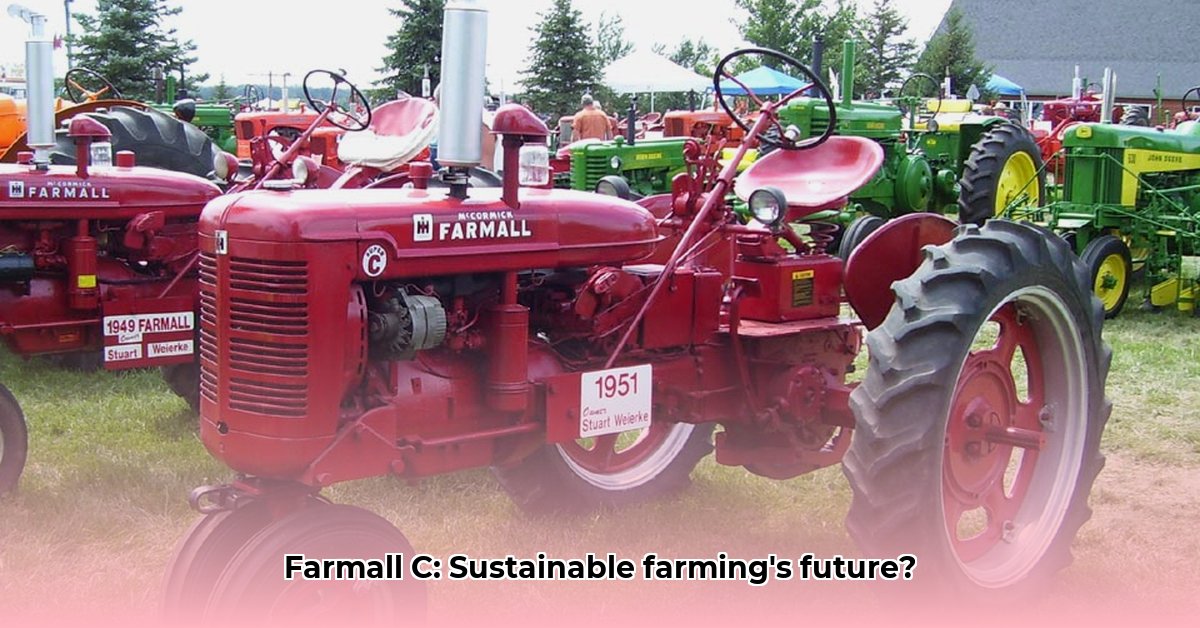
The Farmall C tractor, produced between 1948 and 1951, stands as a pivotal moment in agricultural mechanization. This article examines its multifaceted impact on sustainability, weighing its contributions to increased efficiency against its environmental and socio-economic consequences. For more detailed specifications, see this Farmall C resource.
The Farmall C: A Technological Portrait
The Farmall C, a compact tractor designed for row crops, featured a four-cylinder gasoline engine with a 1.9-liter displacement. Sources cite varying horsepower ratings, ranging from 18 to 23 horsepower at the drawbar, highlighting the need for further research to reconcile these discrepancies. Its manual transmission (four speeds), steering, and brakes represented cutting-edge technology for its time, although these features seem rudimentary by modern standards. This seemingly simple machine, however, profoundly altered agricultural practices and, consequently, the environmental landscape.
Transforming Agricultural Practices
The Farmall C dramatically increased efficiency in planting, harvesting, and other farming tasks. This led to larger-scale farming operations and significantly boosted crop yields, undeniably contributing to feeding a growing global population. However, this efficiency came at a cost. The mechanization facilitated by the Farmall C resulted in substantial job displacement within rural communities, leading to significant social and economic consequences. Did the increased yield outweigh the societal disruption? This remains a crucial question.
Sustainability Analysis: A Complex Equation
Assessing the Farmall C's sustainability requires a nuanced examination of its positive and negative impacts. While increased efficiency arguably reduced the land required for equivalent food production, minimizing habitat loss, the tractor’s relatively low fuel efficiency (compared to modern standards) resulted in higher greenhouse gas emissions. Furthermore, the increased weight of the machinery contributed to soil compaction, potentially impacting soil fertility and water absorption. The following risk assessment matrix illustrates these key considerations:
| Factor | Risk Level | Description | Mitigation Strategies |
|---|---|---|---|
| Fuel Consumption | Moderate | Higher fuel use relative to modern tractors, increased greenhouse gas emissions. | Improved fuel efficiency technologies, exploring alternative fuels (where feasible). |
| Labor Displacement | Moderate | Reduced labor needs; potential job losses and social disruption. | Retraining programs, economic diversification in rural areas, social safety nets. |
| Soil Compaction | Low to Moderate | Potential for soil damage, depending on soil conditions and usage patterns. | Controlled usage, lighter equipment where appropriate, improved soil management. |
| Data Limitations | High | Limited data on long-term fuel consumption, impact on soil health, etc. | In-depth archival research, data modeling using existing historical records. |
Conclusion: A Legacy of Progress and its Paradox
The Farmall C’s legacy presents a compelling case study in the complexities of technological progress. While it undoubtedly increased agricultural efficiency and food production, its environmental and socioeconomic impacts warrant careful consideration. The limitations in available historical data underscore the need for further research utilizing advanced methodologies to fully assess its long-term effects. Understanding the past is crucial for developing truly sustainable agricultural practices in the future. The Farmall C stands as a reminder that responsible innovation demands a comprehensive evaluation of benefits and long-term consequences.
Key Takeaways:
- The Farmall C's impact on sustainability is complex, encompassing both positive and negative aspects.
- A thorough assessment requires a multi-faceted analysis, encompassing fuel consumption, soil compaction, and changes in agricultural practices.
- Data limitations highlight the need for future research to comprehensively understand the tractor's long-term legacy.
- A comparison with modern tractors showcases significant advancements in fuel efficiency and reduced emissions.